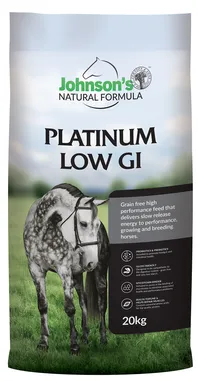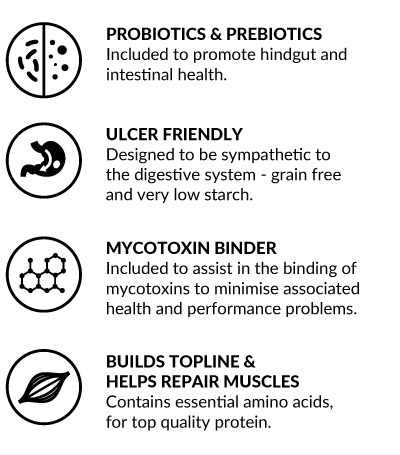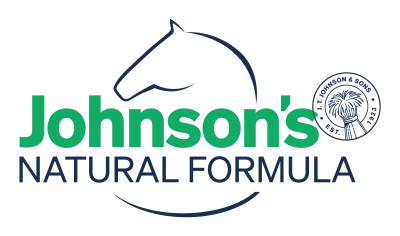

PLATINUM LOW GI
Grain free high performance feed that delivers slow release energy to performance, growing and breeding horses.
Find A StockistDownload Product FlyerFEEDING RECOMMENDATIONS
Introduce any new feeds into your horse’s diet gradually over a 1-2 week period.
Designed to be fed in conjunction with roughage such as pasture and hay. All our products are designed to be fed either wet or dry, except our Fibre Safe feed which is to be fed wet only. You can give our feeds alone or combined with other ingredients (eg. chaff or grains). Horses should receive a minimum of 1% of their body weight in roughage per day.
The suggested feeding rates are a guide, and the amount required will vary depending on the quality and quantity of pasture and hay available, stage of training, exercise intensity, body condition and metabolism of your horse.
Divide into smaller feeds if feeding over 0.5kg per 100kg of body weight per day.
Ensure your horse always has access to clean water.
Johnson’s Platinum Low GI is a low glycemic feed, based on superior high fat and fibre sources. It is a balanced, pelleted feed designed to deliver slow release, sustained and safe energy, while also helping to support body condition and muscle development. Premium ingredients are paired with organic minerals, prebiotics, probiotics and a mycotoxin binder to ensure optimal uptake and performance. A cool feed suitable for horses and ponies in medium to hard work, growing, breeding and spelling horses.
Ingredients
Johnson’s Platinum Low GI contains premium grade export quality Oaten Hay and Lucerne Hay, Lupins, Faba Beans, Full Fat Soybean (GMO free), Soybean Oil (GMO free) and Johnson’s Premium Vitamin and Mineral premix (including chelated minerals, prebiotics, probiotics, and mycotoxin binder).
Feeding Rates
Mature Body Weight Light Work Medium Work Heavy Work 100 0.15 – 0.5 0.5 – 0.1 0.75 – 1.25 200 0.25 – 0.75 0.75 – 1.25 1.25 – 1.75 300 0.5 – 1.0 1.0 – 2.0 1.5 – 2.5 400 1.0 – 2.0 1.5 – 2.5 2.0 – 3.0 500 1.5 – 2.5 2.0 – 3.0 2.5 – 3.5 600 2.0 – 3.0 2.5 – 3.5 3.0 – 4.0 700 2.5 – 3.5 3.0 – 4.0 3.5 – 4.5 Mature Body Weight Spelling/Empty & Early Pregnant Mares Late Pregnant Mares Lactating Mares Stallions Weanlings Yearlings 100 0.1 – 0.2 0.25 – 0.75 0.5 – 1.5 0.25 – 0.75 0.2 – 0.5 0.25 – 0.75 200 0.2 – 0.5 0.5 – 1.0 1.0 – 2.5 0.5 – 1.0 0.25 – 0.75 0.5 – 1.0 300 0.25 – 0.75 1.0 – 2.0 1.5 – 3.0 1.0 – 2.0 0.5 – 1.0 1.0 – 2.0 400 0.75 – 1.5 1.5 – 2.5 2.0 – 3.5 1.5 – 2.5 1.0 – 2.0 1.5 – 2.5 500 1.0 – 2.0 2.0 – 3.0 2.5 – 4.0 2.0 – 3.0 1.5 – 2.5 2.0 – 3.0 600 1.5 – 2.5 2.5 – 3.5 3.5 – 5.0 2.5 – 3.5 2.0 – 3.0 2.5 – 3.5 700 2.0 – 3.0 3.0 – 4.0 4.5 – 6.0 3.0 – 4.0 2.5 – 3.5 3.0 – 4.0
Nutritional Content
Nutrients Energy 10.6 MJ/kg Protein 16.20% Fat 5.00% Fibre 27.70% Lysine 7.2 g/kg Methionine 1.9 g/kg Carbohydrates Starch 0.60% Water Soluble Carbohydrate (WSC) 14.00% Ethanol Soluble Carbohydrate (ESC) 11.10% Non Structural Carbohydrate (NSC) 14.60% Starch + ESC 11.70% Major Minerals Calcium 12.9 g/kg Phosphorus 5.9 g/kg Sodium 5.6 g/kg Chloride 11.8 g/kg Potassium 14.0 g/kg Magnesium 3.1 g/kg Trace Minerals Zinc* 210.20 mg/kg Copper* 78.1 mg/kg Selenium* 1.0 mg/kg Iodine* 2.0 mg/kg Manganese* 147.8 mg/kg Iron* 114.0 mg/kg Chromium 1.0 mg/kg Cobalt 0.8 mg/kg * Included as organic minerals Vitamins Vitamin A 15014.0 IU/kg Vitamin D 1750.0 IU/kg Vitamin E 330.0 IU/kg Vitamin B1 (Thiamine) 19.2 mg/kg Vitamin B2 (Riboflavin) 16.5 mg/kg Vitamin B3 (Niacin) 76.6 mg/kg Vitamin B5 (Pantothenic Acid) 19.1 mg/kg Vitamin B6 (Pyridoxine) 6.6 mg/kg Vitamin B12 (Cyanocobalamin) 32.7 µg/kg Vitamin C 84.7 mg/kg Vitamin K 5.0 mg/kg Biotin 0.3 mg/kg Folic Acid 4.2 mg/kg Choline 25.0 mg/kg
